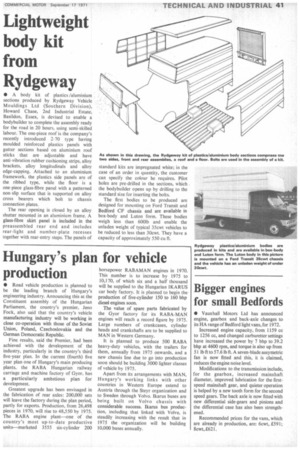Hungary's plan for vehicle production
Page 43

If you've noticed an error in this article please click here to report it so we can fix it.
• Road vehicle production is planned to be the leading branch of Hungary's engineering industry. Announcing this at the Constituent assembly of the Hungarian Parliament, the country's premier, Jeno Fock, also said that the country's vehicle manufacturing industry will be working in close co-operation with those of the Soviet Union, Poland, Czechoslovakia and the German Democratic Republic.
Fine results, said the Premier, had been achieved with the development of the industry, particularly in the country's third five-year plan. In the current (fourth) five year plan one of Hungary's main producing plants. the RABA Hungarian railway carriage and machine factory of Gyor. has a particularly ambitious plan for development.
Greatest upgrade has been envisaged in the fabrication of rear axles: 200,000 sets will leave the factory during the plan period, partly for exports. Production, from 26,498 pieces in 1970, will rise to 48,550 by 1975. The RABA engine plant—one of the country's most up-to-date productive units—marketed 3555 six-cylinder 200
horsepower RABAMAN engines in 1970. This number is to increase by 1975 to 10,170, of which six and a half thousand will be supplied to the Hungarian 1KARUS car body factory. It is planned to begin the production of five-cylinder 150 to 160 bhp diesel engines soon.
The value of spare parts fabricated by the Gyor factory for its RABA-MAN engines will reach a record figure by 1975. Large numbers of crankcases, cylinder heads and crankshafts are to be supplied to MAN in Western Germany.
It is planned to produce 500 RABA heavy-duty vehicles, with the trailers for them, annually from 1975 onwards, and a new chassis line due to go into production soon should be building 3000 lighter classes of vehicle by 1975.
Apart from its arrangements with MAN, Hungary's working links with other countries in Western Europe extend to Austria through the Steyr organization and to Sweden through Volvo. Ikarus buses are being built on Volvo chassis with considerable success. Ikarus bus production, including that linked with Volve, is steadily increasing with the result that in 1975 the organization will be building 10,000 buses annually.




















































































































